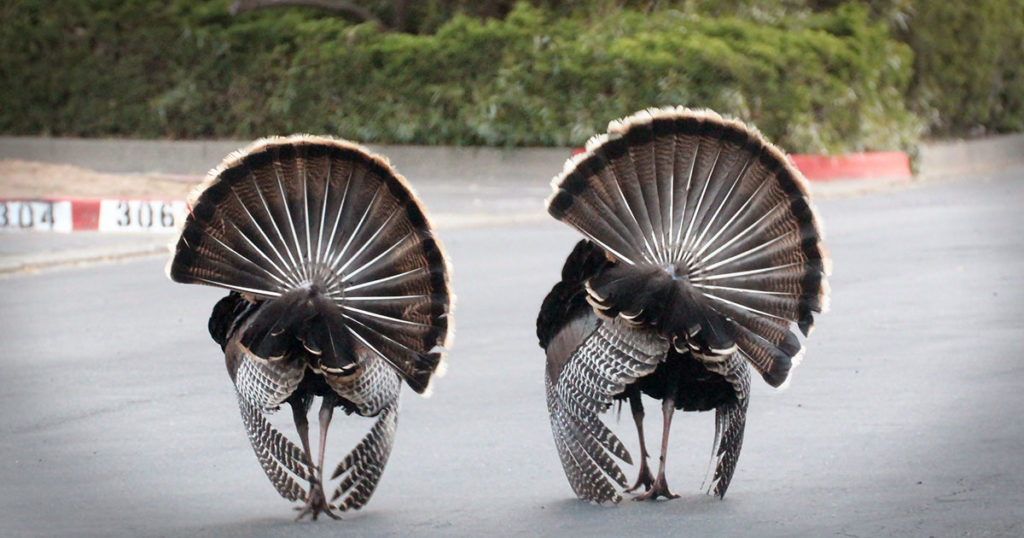
3:57. That’s what my phone says when I look at it—the phone I’m presently clutching like a security blanket.
In a minute, when I check next, it’ll say 3:58. At least I assume so.
Not that it matters, the state of nearly-four-o’clock-ness on a Thursday afternoon. Because in the week we—my husband Steven, my daughter Celia, Celia’s friend Rachel, who’s staying with us, and I—have spent socially isolating, time has turned strangely liquid, pooling in droplets here, rushing in a torrent there, so a minute lasts two hours and a half-day zips by in a wink. And it’s only going to get worse.
“It’s nearly four,” I say aloud, because sometimes I just say things now, for no good reason. Steven grunts in response. Celia and Rachel ignore me in favor of watching the spectacle occurring on our lawn.
Think dinosaurs, huge and ancient-looking, with red-rimmed, nail-head eyes. Think pointy beaks curved downward like scimitars. Think crazed expressions, ready to throw down if we so much as sneeze.
I’m talking wild turkeys, a pair of them strutting across my Detroit lawn.
Mind you, turkeys have ventured into our neighborhood for years. Still, seeing them this close isn’t so common, which explains why we four have—gasp—peeled ourselves off couches and beds and chairs, why we’ve left the confines of the house where we’ve been waiting out the pandemic. And why we’re gathered on the porch, all of us sleepy from prolonged inactivity, squinting into the brightness of this late-March day.
“Who knew that still happened,” says Steven.
“What? The sun shining?”
“Yup,” says Steven. Then he goes quiet.
Though it’s only been a week, I fear this new landscape of enforced togetherness will deplete the store of things we’ve got to say to each other. I read recently that divorce rates are skyrocketing among Chinese couples forced to quarantine, and I wonder what the social outcomes of distancing and shelter-in-place orders will be for us Americans.
But when it comes to Steven and me, we’ll be fine. Because who needs fancy conversation when nature’s putting on a pageant mere steps from our door?
That’s where the wild turkeys—an enormous tom with splendid wattles and caruncles and, based on her smaller size and muted coloring, a hen—currently gobble and purr and generally rampage through the dried thicket of our winter-dull yard. Where they dive headfirst into naked shrubs just feet from our feet.
“Wow,” says Rachel when, in a burst of inspiration, the tom spreads his massive wings and launches himself onto the roof of Steven’s van.
“Oof. My paint job!”
“Like anyone will notice,” I say. “It’s not like we’re going anywhere.”
“Shhh,” Rachel says. “You’ll scare them.” She pulls out her phone and starts filming.
Steven and I share a look because, really, nothing’s going to frighten these guys.
Meanwhile, at an unknown-to-us signal, both the tom and hen erupt into the air. They alight atop our house, so we four turn and look up—we can’t help it. Because it’s always riveting: the grandeur of these creatures, as distant from their lazy domesticated cousins as a wolf is from a Pekinese.
“They seem bolder than usual today,” I say.
Steven nods. “They’re the natives here. And now we humans are retreating indoors, so these guys probably decided to recolonize the neighborhood.”
“Lots of wild animals are moving into cities,” says Celia. “Look at the monkey riots.” She passes me her phone, open to a story about thuggish gangs of rhesus macaques causing mayhem in Delhi, India.
“Good lord. They killed a politician,” I say.
“He probably had it coming,” mutters Steven.
“It’s happening a lot. All over the world,” continues Celia, checking out the tom, who’s settled on our chimney like a perky little house-hat.
“What? Murder by monkey?”
“No. We’ve taken all their space, so they’re coming into ours. Did you hear about the dolphins in Venice?”
Yes. Just yesterday, I’d read about dolphins frolicking in the empty canals as human Venetians languished indoors and the tourist hordes stayed away. I take a quick moment and wish them well, all the stricken peoples everywhere. But though I don’t tell Celia, the dolphin story was debunked almost immediately. Still, it’s true that nature abhors a vacuum, and eventually wild creatures will stake their claim.
Unlike many American cities, my Detroit got a head start on the return-to-nature phenomenon. Decades of decline began in the middle of the last century and led to vast tracts of empty land. As a result, we’re home to pheasants and fox, white-tailed deer, coyotes—and wild turkeys planning their diabolical strategies for takeover.
“Holy …” says Rachel as the tom spreads his wings again and gobbles mightily in a demand for dominance. “He’s just so …”
So fierce, so incredibly impressive.
In the before-time that ended only a week ago, Detroit had been enjoying unprecedented expansion. New condos popped up by the dozens; shiny eateries and fun shops emerged from rubble and scraps; construction buzzed. And the wildlife retreated from well-trafficked areas.
Now silence reigns on my once-busy street—other than the turkeys’ clamor. The doors up and down my block remain shut tight. A stray human, his shoulders hunched to ward off pandemic, meanders into view with his leashed dog. He raises a tentative hand in our direction; we raise ours in return. He gets closer, is about to pass, then stops short at the sight of the turkeys.
We all five—six counting the dog—stand there watching, until the turkeys decide they’re done with us for now and, in a great gust of wind, rise and flap behind some trees. The man and his dog continue on their way. We four retreat into isolation. For weeks? Months?
Who knows. Until the all-clear is called and we’ll emerge, a new species creeping from our house-cocoons, clutching our phones—our beloved darlings. And we’ll start over again, relearning the meaning of time. Blinking sunlight from our eyes.

